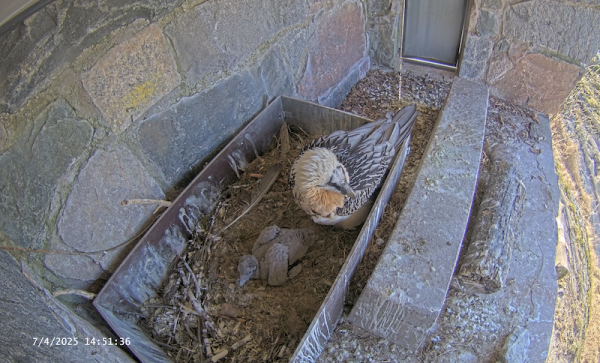Bearded vulture chick hatched in Helsinki Zoo supports species conservation

- Next Article Speeding stop leads to Finland’s largest amphetamine seizure
A bearded vulture chick has hatched at Korkeasaari Zoo, marking the fifth consecutive successful breeding for its parents. The chick is expected to play a role in the species’ conservation and reintroduction into European mountain habitats.
The parents alternated incubation for nearly two months. In early March, a grey-feathered chick emerged.
The adult pair now feed it bone-rich meat and small prey animals, preparing them and offering meat directly to its beak. One parent stays at the nest to provide warmth.
Jonne Stenroth, an animal keeper at Korkeasaari, said the zoo monitors the family via a nest camera.
“We give the parents peace to care for the chick themselves and monitor through the nest camera that everything is going well. The chick is strong and already about one-third the size of an adult. It will likely join efforts to strengthen the wild population, like its three previous siblings,” Stenroth said.
The European Endangered Species Programme (EEP) will determine the chick’s future. More than 40 zoos across Europe participate in the bearded vulture breeding programme. Only 25 chicks have hatched this spring. Most will be transferred to the wild, while a few remain in zoos to become future breeding adults.
The bearded vulture reintroduction programme is considered a conservation success. The species disappeared from the Alps in the early 20th century due to persecution. The current population of approximately 300 birds in the Alps originates entirely from zoo-released individuals and their offspring.
Bearded vultures reproduce slowly. They reach breeding age at about six years and usually produce only one chick per year. The species is classified as vulnerable in Europe.
Korkeasaari Zoo has supported the conservation of bearded vultures through the Vulture Conservation Foundation since 2015. In 2024, funding supported preparations for a new reintroduction site in Bulgaria. Birds from Korkeasaari have already been released in the German Alps, Andalusia, Corsica, and the French Alps.
HT
- Next Article Speeding stop leads to Finland’s largest amphetamine seizure
Source: www.helsinkitimes.fi
